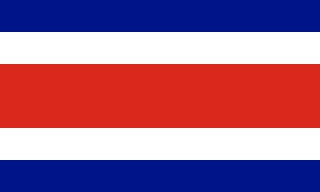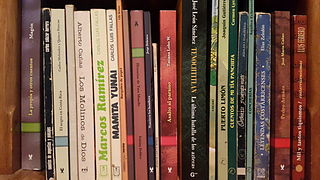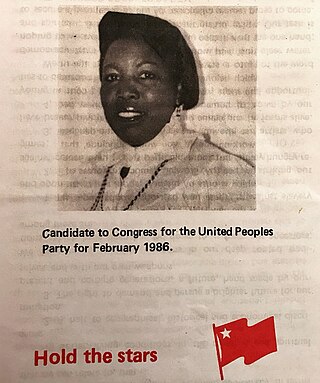
Costa Rica, officially the Republic of Costa Rica, is a country in the Central American region of North America. Costa Rica is bordered by Nicaragua to the north, the Caribbean Sea to the northeast, Panama to the southeast, and the Pacific Ocean to the southwest, as well as maritime border with Ecuador to the south of Cocos Island. It has a population of around five million in a land area of 51,060 km2 (19,710 sq mi). An estimated 333,980 people live in the capital and largest city, San José, with around two million people in the surrounding metropolitan area.

San José is the capital and largest city of Costa Rica, and the capital of the province of the same name. It is in the center of the country, in the mid-west of the Central Valley, within San José Canton. San José is Costa Rica's seat of national government, focal point of political and economic activity, and major transportation hub. San José Canton's population was 288,054 in 2011, and San José's municipal land area is 44.2 square kilometers, with an estimated 333,980 residents in 2015. Together with several other cantons of the central valley, including Alajuela, Heredia and Cartago, it forms the country's Greater Metropolitan Area, with an estimated population of over 2 million in 2017. The city is named in honor of Joseph of Nazareth.

Alajuela is a province of Costa Rica. It is located in the north-central part of the country, bordering Nicaragua to the north. It also borders the provinces of Heredia to the east, San José to the south, Puntarenas to the southwest and Guanacaste to the west. As of 2011, the province had a population of 885,571. Alajuela is composed of 16 cantons, which are divided into 111 districts. It covers an area of 9,757.53 square kilometers.

Sergio Ramírez Mercado is a Nicaraguan born and naturalized Colombian citizen, writer and intellectual who was a key figure in 1979 revolution, served in the leftist Government Junta of National Reconstruction and as vice president of the country 1985–1990 under the presidency of Daniel Ortega. He has been described as Nicaragua's "best-known living writer". Since the 1990s, he has been involved in the left-wing opposition to the Nicaraguan government, in particular in the Movimiento de Renovación Sandinista. He was exiled from the country in 2021 and stripped of his nationality by the government in 2023.

The Legislative Assembly forms the unicameral legislative branch of the Costa Rican government. The national congress building is located in the capital city, San José, specifically in Carmen district of the San José canton.
Julieta Pinto was a Costa Rican educator and writer. She was a recipient of the Aquileo J. Echeverría Award.
Alfonso Chase is a contemporary Costa Rican author.

Joaquín Gutiérrez Mangel was a Costa Rican writer who won multiple awards, and whose children's book Cocorí has been translated into ten languages. In addition to writing children's books, Gutiérrez was a chess champion, war correspondent, journalist, story-teller, translator, professor, and communist activist.
Fabián Dobles Rodríguez was a Costa Rican writer and left-wing political activist. An author of novels, short stories, poems, and essays, he earned international recognition as an author dealing with the plight of the poor and with social protest. Dobles is considered one of the most important writers in what critics have identified as the "'40s generation" of Costa Rican literature. He was also an active militant in the Communist Party of Costa Rica.

Jorge Eduardo Arroyo-Pérez is a Costa Rican writer, playwright, opinion columnist, essayist, poet and theater director. He is currently Costa Rica's ambassador to UNESCO.

Clodomiro Picado Twight, also known as "Clorito Picado", was a Costa Rican scientist who was internationally recognized for his pioneering research on snake venom and the development of various antivenins. His work on molds was a precursor to the formal discovery of penicillin and resulted in compounds which he used to treat patients at least one year before the re-discovery of penicillin by Alexander Fleming. He wrote over 115 works, mainly books and monographs.
Alberto Cañas Escalante was a politician, writer, intellectual, public servant, and journalist from San José, Costa Rica. He is known as one of the most important figures in the cultural, political, and social life of Costa Rica during the latter half of the twentieth century. The National Library System of Costa Rica credits Cañas with more than 4,773 publications as of 2005.

Costa Rican literature has roots in colonization and is marked by European influences. Because Costa Rica is a young country, its literary tradition is also young. The history of Costa Rican literature dates to the end of the 19th century.
Reinas de Costa Rica is a national beauty pageant in Costa Rica that selects representatives to the Miss World and Miss International pageant. After the Miss Costa Rica pageant stopped sending contestants to the Miss World and Miss International pageants in 2006, the franchise was acquired by the Reinas de Costa Rica organization presided by Alan Aleman. However, after two years of absence in the Miss World pageant in 2017-2018, the organization eventually lost the franchise to the newly established contest, Concurso Nacional de Belleza de Costa Rica, in 2019. The organization also lost the Miss Earth franchise to Jose Vásconez in 2016.

Anacristina Rossi is a Costa Rican writer.

Roxana Pinto Lopez is a Costa Rican poet, novelist and essayist.

María Fernández de Tinoco was a Costa Rican writer and amateur archaeologist who became the First Lady of Costa Rica in 1917. Educated in England, Fernández studied archaeology, art and music before returning to Costa Rica. Involved in amateur archaeological digs and charitable works, she wrote articles for publication in local newspapers and magazines and published two novels. When her husband staged a coup d'état and was later elected President of Costa Rica, she served as First Lady from 8 June 1917 to 20 August 1919. When he resigned from his post due to mismanagement, the couple moved to Paris, where she participated in archeological and artistic works until his death in 1931. From 1932 to 1934, she resided in Norway before returning to Costa Rica, where she resumed her archeological studies and publishing, while working for the National Museum of Costa Rica. Involved with the Red Cross, she was awarded the Florence Nightingale Medal in 1949 and in 2012, the Ministry of Culture of Costa Rica produced a documentary about her life.

Julieta Dobles Yzaguirre is a Costa Rican poet, writer, and educator. She is a five-time winner of the Aquileo J. Echeverría Award and received the Magón National Prize for Culture in 2013.
Mirta González Suárez is a Costa Rican social psychologist and novelist. She is an emeritus professor of psychology at the University of Costa Rica, where she has conducted research in women's studies and political psychology. Her first novel, Crimen con sonrisa, won a national literary award, the Aquileo J. Echeverría Award in 2013. In 2016 she won the award "UNA palabra" by the National University of Costa Rica for her novel "La gobernadora" and in 2021 the "Juegos Florales Hispanoamericanos de Quetzaltenango 2021" for the novel "La Independencia".

Maunrice Eulalee Bernard Little, known as Eulalia Bernard, was a Costa Rican writer, poet, activist, politician, diplomat, and educator. She is considered in her country as an icon of the African descent culture. Bernard was the first Afro-Costa Rican woman to be published in her country.













